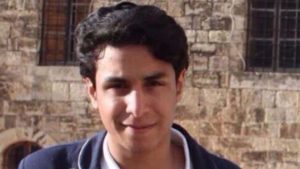
Mohammad Mostafaei (attorney) 
The following is a letter I have sent to the head of Iran’s judiciary:
In the name of God the creator
The Honorable head of the Judiciary
His Excellency Ayatollah Sadegh Larijani
Greetings,
I have been informed by the Tehran and Shiraz criminal tribunals that a few of my clients who had been arrested and detained for committing murder when they were under the age of eighteen will be hanged within the coming days. Despite the fact that Qisas (Islamic retribution) ruling in their case is not desirable for reasons that I have listed below, the honorable judges of the justice department have ruled that the death sentences shall be upheld for reasons that remain unclear to me and are not up to justice and legal norms.
1. Prior to the Islamic revolution, and based on the criminal code passed in 1302 and 1352, it was common practice that capital crimes, including murder and drug trafficking, committed by persons under the age of 18 were punishable by lighter sentences, with the rehabilitation of the convicts in mind. After the victory of the Islamic revolution in 1979, against all expectations that it would generally bring about more Islamic compassion — for minor criminals in particular — the judicial procedures and regulations abruptly changed. Based on Article 49 of the Islamic criminal code, courts decreased the legal age to the legal maturity age defined by Sharia rulings. Since the criminal code did not define any age as the legal maturity age, the court rulings were issued based on article 1210 of the Islamic criminal code, which defines the age of maturity for females as 9 lunar years and 15 lunar years for males. This has become the legal standard used by courts in capital cases to this date.
2. Such practices continued until 1372, at which point the Convention on the Rights of the Child was debated in a public session of Majlis. In line with a majority of countries who had ratified the convention, a majority of the members of Majlis passed a bill ratifying the aforementioned convention on 19/10/1372 during session 182 of the parliament. The bill was passed under the following condition: If the Convention on the Rights of the Child is not in contravention of national and Islamic laws, it shall be considered binding by the Islamic Republic of Iran.
3. Your Excellency is well aware that article 96 of the constitution states that only a majority of the clergy members of the guardian council can rule in cases where bills passed by the Majlis are in contravention of Islamic laws, and in cases of contravention with the constitutional laws, the vote of the majority of all members of the guardian council is required to declare a bill unconstitutional. Therefore, after the convention on children’s rights was ratified by the Majlis, it was sent to the guardian council. Since the Majlis had ratified the convention in its entirety, the honorable guardian council sent back to the Majlis, on 4/11/1372, the following recommendations in its 5760 opinion paper: “You have agreed to all articles of the convention. The council will not agree in the future with articles that are against Sharia laws. Therefore, there should be clarification on the articles which are not acceptable to us.” The members of the guardian council then listed the articles that were not in accordance with Sharia laws: “Articles 12(1), 13(1), 13(2), 14(1), 14(2), 14(3), 15, 16(1) and 29(1D) are in contravention of common Sharia norms. Therefore, based on this opinion and based on article 9 of the civil law which prohibits those international treaties that are against the constitution to become law, we rule that, with the exclusion of the aforesaid articles, all others articles of the convention are binding and shall be respected by officers of justice and judiciary.”
4. One such article that, based on the ruling by the guardian council, shall be respected is article 37 of Convention on the Rights of the Child, which states: “No child shall be subjected to torture or other cruel, inhuman or degrading treatment or punishment. Neither capital punishment nor life imprisonment without possibility of release shall be imposed for offences committed by persons below eighteen years of age.” This article, as an article of law, has been forgotten and set aside by all judicial authorities, who do not take it into consideration in their rulings. Not considering this article as binding has resulted in severe damage to the international image of the Islamic Republic of Iran and has made Iran the world’s leader in death sentences for minors. Currently only five countries sentence people to death for crimes they have committed when they were under the age of 18. Unofficial statistics show that, since 1386, thirty five children have been hanged in the world. Iran stands at the top of the list with 29 cases, followed by Saudi Arabia and Soudan with 2 cases each, and Pakistan and Yemen with 1 case each. No new cases have been reported in the four other countries in the last two years. These statistics very clearly display the importance of reminding judicial officials to rule based on article 37 of the Convention of the Rights of the Child, but also that, considering the importance and sensitivity of this matter, the executions of those guilty of committing a crime while under the age of 18 should cease altogether.
I have been the defense lawyer in 36 such cases, working pro bono. This has given me the chance to conduct extensive research on the legal implications of such cases as well as the psychological effects that these procedures inflict on convicted minors who are on death row. My research, done in consultation with legal experts and university professors, has convinced me that criminals who commit their act when they are under the age of 18 should not be sentenced to death or life imprisonment. Unfortunately until now 3 of my clients, named Behnam Zareh, Delaram Darabi and Sayed Mohammad Hejazi, have been hanged in Shiraz, Rasht and Isfahan, without any advanced notice to me as their lawyer. 8 other clients have escaped the death penalty in different ways and have since come back to society. Currently the list of my clients on death row includes: Behnoud Shjaie and Safar Angouti, whose cases are in the hands of the criminal tribunal of Tehran; Mohammad Reza Haddadi, Mohammad Jahedi, Rahim Ahmadi Kamalabadi and Amir Amrolehai, with cases handled by Criminal tribunal of Shiraz; Bahman Soleimani with his case at the tribunal of Isfahan; and finally Abbas Hosseini in Mashhad. All of them could be shortly executed after clearance by the executive branches of the tribunals. It has been ruled that death sentences should be executed within the next few days for three of my clients, Behnoud Shojaie, Safar Angouti and Mohammad Reza Haddadi, all of whom were arrested when they were 15 years old.
Your Excellency,
This short letter does not give me the time to set all legal, moral and religious grounds and arguments against the death penalty for criminals who committed their act when they were under the age of 18, but I would like to emphasize that the law has been neglected by the judicial officials who have ruled in these cases, and I am demanding to be granted a meeting with you to discuss the matter further. I urge you to take necessary steps so children who have committed criminal acts can be rehabilitated and reintroduced to society. Based on the aforementioned explanations, it is a fact that, at least in the cases pertaining to minors sentenced to capital punishment, the judges of the justice department have not acted based on the law and have had a different interpretation of judicial facts. As the head of the judiciary and the highest judge of the country, you are able to put a stop to the execution of minors. Do not let past mistakes be repeated and tarnish the image of the Islamic Republic and its sacred place by upholding rulings that are against human rights.
I am convinced that social problems will not be remedied by the execution and elimination of criminals. Children are vulnerable human beings and need special attention. They do not commit crimes because of premeditated motives. Their crimes should not be looked at as organized crime with the intent to disturb social peace and security. Children commit crime without premeditation or motive and then find themselves in prison. They need support. Killing and executing them will not erase social problems that can be only solved by understanding the roots and reasons of their actions.
Finally, as the lawyer for many minors who are on death row, and on the eve of International Child’s day, I would once again like to emphasize that none of my clients deserve to be executed. Therefore, I demand that the points I brought up in this letter be investigated and an immediate stay of execution be issued. I deeply believe life is a gift that has been given by God. I have tried to save the lives of dozen of minors in the past two years and I have been helped by many civil rights activists and government officials as well. It is my hope that your insight will help remove the wrongdoings of some officials and will put an end to this unjust type of punishment.
Respectfully yours,
Mohammad Mostafaie, defense lawyer for many children currently on death row
Source for English Translation: Human Righs Activists In Iran



